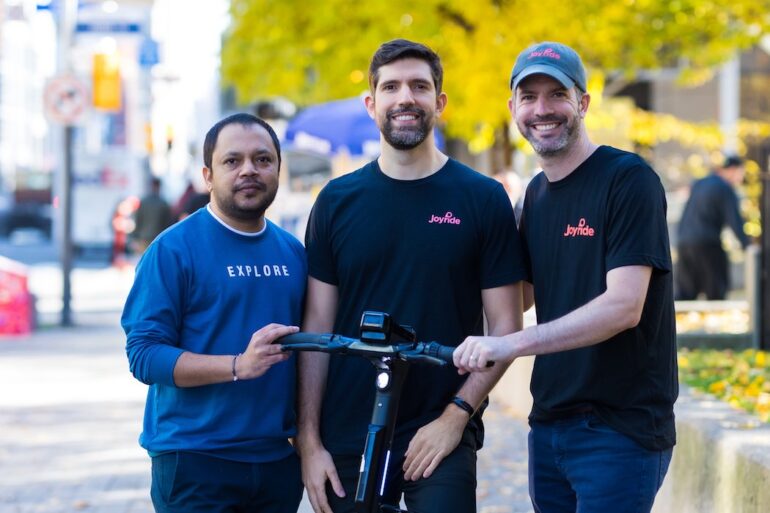Toronto-based software startup Joyride has closed $7 million CAD ($5.2 million USD) in Series A funding as it looks to sell its mobility software to larger customers.
The round was led by mobility giant Yamaha Motors, with participation from Export Development Canada, and returning investors Urban Innovation Fund, Proeza Ventures, and Two Small Fish Ventures. Joyride’s Series A comes almost three years after its last seed financing round, which totalled $4.6 million CAD ($3.7 million USD). To date, the startup has raised approximately $10 million USD.
“We spent the past couple of years really working on tailoring our product and figuring out a way that we can deploy with larger operators.”
Vince Cifani
Founded in 2014, Joyride began with a bicycle-tracking system that has evolved into a white-label software solution that allows operators to launch, manage, and grow public or private fleets of scooters, bikes, e-bikes, and other connected, keyless, and sustainable vehicles.
The startup aims to simplify fleet management and Internet of Things (IoT) connectivity with a branded rider app, backend analytics, multimodal vehicle integrations, and insurance access.
Joyride claims its software already powers electric vehicle deployments in more than 250 markets across five continents. According to the company, its software has helped offset 2.6 million kilograms of greenhouse gas emissions and save 296,000 gallons of gasoline.
Since its founding, Joyride has been focused on serving small and medium-sized operators, but after closing its $4.6-million CAD seed round, saw an opportunity to help more enterprise businesses and original equipment manufacturers (OEMs) with its platform.
“We spent the past couple of years really working on tailoring our product and figuring out a way that we can deploy with larger operators with the kinds of solutions that they needed to launch a shared mobility business or a connected vehicle business,” Joyride’s CEO and founder Vince Cifani told BetaKit.
Cifani declined to say whether Yamaha Motors is among those customers, but noted Joyride is currently working with the firm’s golf car business, adding that the startup has many customers who are interested in offering golf cars as a shared mobility service.
“We… wanted to find someone strategic to bring into the business where we can collaborate, not just have them as an investor, but also have them as a long-term partner in the business,” Cifani added.
In a statement, Mike Chrzanowski, president and CEO of Yamaha Motors’ US business, said he shares Joyride’s bullishness on “the mass market appeal for smart vehicles that are empowered, managed and joined through one hardware-software solution.”
In addition to working with Yamaha Motors, Joyride partnered with electric vehicle manufacturer GEM in October to give operators a way to deploy low-speed vehicles for shared use.
According to a 2023 report from McKinsey, shared mobility solutions could generate up to $1 trillion in consumer spending by 2030. That same report found that 56 percent of consumers are willing to replace trips taken in private vehicles with future shared autonomous vehicles.
Joyride hopes to gain a foothold in this market, and will put the new capital toward advancing its tech solutions and continuing to expand its offerings for OEMs and more enterprise customers.
“We’re thrilled to be evolving alongside a transforming mobility sector,” Cifani added. “This investment solidifies our vision to power every electric low-speed vehicle in the world.”
Feature image courtesy Joyride.


